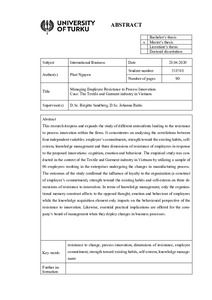Managing Employee Resistance to Process Innovation Case: The Textile and Garment industry in Vietnam
Nguyen, Phat (2020-04-29)
Managing Employee Resistance to Process Innovation Case: The Textile and Garment industry in Vietnam
Nguyen, Phat
(29.04.2020)
Julkaisu on tekijänoikeussäännösten alainen. Teosta voi lukea ja tulostaa henkilökohtaista käyttöä varten. Käyttö kaupallisiin tarkoituksiin on kielletty.
avoin
Julkaisun pysyvä osoite on:
https://urn.fi/URN:NBN:fi-fe2020052038546
https://urn.fi/URN:NBN:fi-fe2020052038546
Tiivistelmä
This research deepens and expands the study of different antecedents leading to the re-sistance to process innovation within the firms. It concentrates on analysing the correlations between four independent variables: employee’s commitments, strength toward the existing habits, self-esteem, knowledge management and three dimensions of resistance of employ-ees in response to the proposed innovations: cognition, emotion and behaviour. The empiri-cal study was conducted in the context of the Textile and Garment industry in Vietnam by utilizing a sample of 96 employees working in the enterprises undergoing the changes in manufacturing process. The outcomes of the study confirmed the influence of loyalty to the organization (a construct of employee’s commitment), strength toward the existing habits and self-esteem on three dimensions of resistance to innovation. In terms of knowledge management, only the organizational memory construct affects to the opposed thought, emo-tion and behaviour of employees while the knowledge acquisition element only impacts on the behavioural perspective of the resistance to innovation. Likewise, essential practical implications are offered for the company’s board of management when they deploy changes in business processes.
